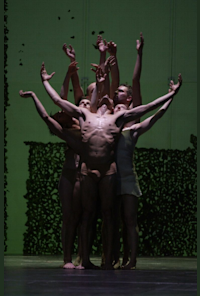


Dido and Aeneas, Purcell
Del
Staatsoper Unter den Linden ( State Opera Berlin ) (2019)
Oplysninger fra kunstorganisation (verificeret af Operabase)
Dido and Aeneas by Purcell, søn. 03 nov. 2019, Fra (2019/2019), Instrueret af Sasha Waltz, Dirigent Christopher Moulds, Staatsoper Unter den Linden, Berlin, Germany
Viser Cast og Crew for 03 nov. 2019
Conductor
Stage director
Medvirkende
Belinda
Second Woman
(Second woman)
Aeneas
Sorceress
First Witch
(First witch)
Second Witch
(Second witch)
Spirit
Sailor
(First sailor)
Produktionshold
Set designer
Costume designer
Lighting designer
Choreographer
Ensemble
Orkester
Ballet eller dansekompagni
Andet
Lær mere om komponist
Lær mere om musikværk




